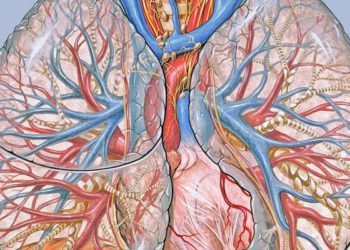Patient Basics: Cystic Fibrosis
Originally published by Harvard Health.
What Is It?
Cystic fibrosis is an inherited disease. It causes cells to produce mucus that is sticky and thicker than normal. This mucus builds up, particularly in the lungs and organs of the digestive tract.
Cystic fibrosis affects many parts of the body, including the lungs, liver, pancreas, urinary tract, reproductive organs and sweat glands. Certain cells in these organs normally make mucus and other watery secretions. But in cystic fibrosis, these cells produce secretions that are thicker than normal. This leads to other problems.
In the lungs, thick secretions trap germs. This leads to repeated lung infections.
In the pancreas, thick secretions block the normal flow of pancreatic juices. This makes it more difficult for the body to digest and absorb fats and fat-soluble vitamins. This can lead to nutritional problems, especially in babies.
Other problems related to cystic fibrosis include:
- Sinus infections
- Nasal polyps
- Pancreatitis
- Diabetes
- Liver problems, including cirrhosis
- Infertility, especially in males.
To develop cystic fibrosis, a person must inherit two cystic fibrosis genes. One gene is inherited from each parent.
People who inherit only one cystic fibrosis gene are called cystic fibrosis carriers. They can pass the cystic fibrosis gene to their children. But they do not have the disease themselves.
Symptoms
Symptoms of cystic fibrosis usually appear within the first year of life. Sometimes symptoms do not appear until late childhood or adolescence.
The severity of symptoms varies. Some people have severe symptoms involving various organs. Others have a much milder form of the disease involving only one area of the body.
At birth, a child with cystic fibrosis can develop a swollen belly. He or she will vomit due to a condition called meconium ileus. In this condition, the bowel is plugged up with meconium. Meconium is a thick, dark, sticky substance produced by all babies while in the uterus. It is just stickier in a newborn with cystic fibrosis.
As the child grows, other symptoms can develop. These include:
- Poor weight gain in spite of a good appetite. This is usually because of problems with digestion and the absorption of food. Absorption of fats and fat-soluble vitamins (A, D, E and K) is especially poor.
- Large, foul-smelling, fat-filled, “greasy” stools
- Frequent episodes of diarrhea
- A swollen belly with gas and discomfort
- Repeated lung infections, leading to poor lung function
- Repeated sinus infections
- Wheezing and shortness of breath
- Chronic cough, which can produce heavy, discolored mucus or blood
- A salty “frosting” on the skin, or a salty taste when kissed
- Delayed sexual development
Diagnosis
Your doctor may suspect cystic fibrosis based on your child’s:
- Symptoms
- Medical history
- Family history of cystic fibrosis
- Physical examination results
To confirm the diagnosis, your doctor will order a sweat test. A sweat test is a painless procedure that measures the amount of salt in skin sweat.
Newborns are too tiny to make enough sweat for a sweat test. Instead, a blood test can confirm the diagnosis. Many states now routinely screen newborns for cystic fibrosis.
Expected Duration
Cystic fibrosis is a lifelong illness that requires constant monitoring.
The severity of the illness typically varies over time. Periods of worsening symptoms may require more intense medical treatment and even hospitalization.
Prevention
There is no way to prevent cystic fibrosis. People with a family history of cystic fibrosis can undergo genetic testing to determine their chance of passing this disease on to their children. A blood test can detect most genetic mutations that cause cystic fibrosis.
Treatment
Treatment depends on the severity of the disease and the body parts involved. Close regular monitoring is essential.
Lung disease can be treated with antibiotics, mucus-thinning drugs and chest physical therapy. In chest physical therapy, a therapist or family member drums the person’s chest and back with cupped hands to help clear mucus from the lungs. Older people with cystic fibrosis sometimes can do this therapy themselves. Special vests that attach to machines can vibrate the chest, too. In severe cases, a lung transplant may be an option.
Digestive problems are treated with special diets, pancreatic enzymes and vitamin supplements.
When To Call a Professional
Call your doctor if your child has any symptoms of cystic fibrosis. These include:
- Frequent respiratory infections
- Persistent abdominal discomfort and gas
- Repeated episodes of diarrhea
- Greasy foul-smelling stools
- Poor weight gain despite a good appetite
Prognosis
Life expectancy depends on the severity of disease and the parts of the body involved. The average life span of a person with cystic fibrosis continues to increase.
Lung disease has the strongest impact on illness severity. Death usually is caused by lung complications.
Additional Info
National Heart, Lung, and Blood Institute (NHLBI)
P.O. Box 30105
Bethesda, MD 20824-0105
Phone: 301-592-8573
TTY: 240-629-3255
Fax: 301-592-8563
http://www.nhlbi.nih.gov/
Cystic Fibrosis Foundation
6931 Arlington Road
Bethesda, MD 20814
Phone: 301-951-4422
Toll-Free: 1-800-344-4823
Fax: 301-951-6378
http://www.cff.org/




